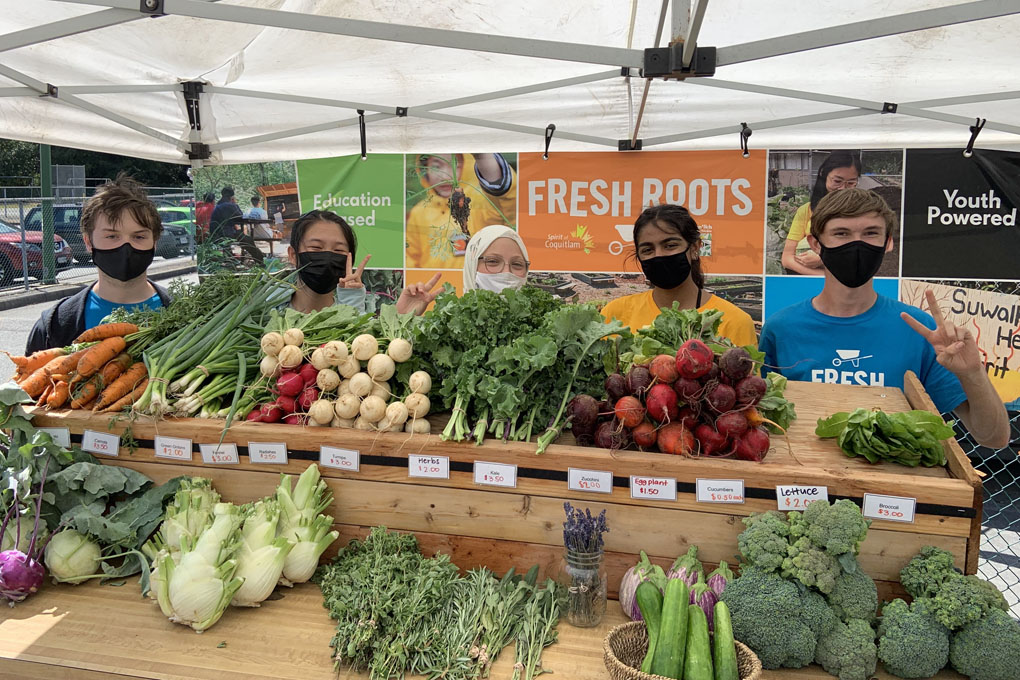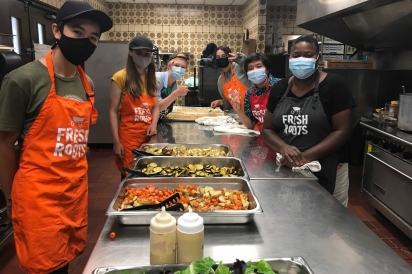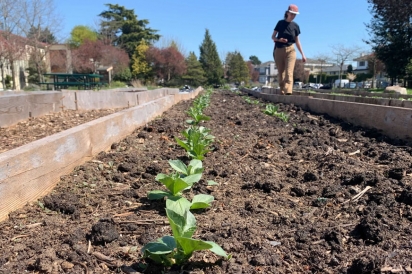Sprouting Young Urban Gardners
The start of the growing season and a harvest of kale, tomatoes, radishes, peas, potatoes and everything in between — that’s what spring means to Fresh Roots Urban Farm Society. A non-profit organization advocating good food for all, its members say that communities coming together to create a locally sustainable food system is as important as the food itself — and the first step is education.
Fresh Roots operates commercially viable farms at Vancouver Technical Secondary School, David Thompson Secondary, Suwa’lkh School in Coquitlam, and works in tandem with the Delta School District at its eight-acre Boundary Bay farm. The organization offers field trips to its many sites for kindergarten through to Grade 12 students, including after-school groups such as Scouts or Guides. Its outdoor field classes use farming and food as a catalyst to teach a variety of topics that complement the current B.C. school curriculum. Educators correlate indoor learning, such as the biology of plant re-production, to the real-life experience of watching bees busily pollinating plants in the farm fields. Other classes invite students to use grocery store items to make dishes. They learn where the food came from, the complexity of the global food system and how these same items could have been grown locally.
Alexa Pitoulis, executive director of Fresh Roots, says it’s the ability to fill the gaps between classroom learning and real- world experience that makes the organization unique.
Grade 7 teacher Gaye Dalla-Zanna agrees that with the state of the world today, specifically climate change, we need to find ways to be resourceful and knowledgeable about our food sources. Students need to learn how to treat the earth so we can reap the rewards of its gifts, she says.
It all began in 2009. Gray Oron, Ilana Labow and Marc Schutzbank were friends and urban agricultural enthusiasts who wanted to see how much food they could grow for their families, friends and community in East Vancouver’s urban environment. Little did they know that a garden fence shared with Queen Alexandra Elementary School would change ev- erything. The school asked if the gardeners on the other side of the fence would help them transform its fallow garden into something that would help provide produce for its farm-to-school program. According to Oron, the administrators asked for a parcel of land in exchange for any help they’d give. Working together, parents, teachers and community members restored the school’s garden and an edible schoolyard sprouted.
Four years later, Fresh Roots was working with the Vancouver School Board, offering professional development food-literacy seminars to B.C. educators and operating a market-scale educational farm at Vancouver Technical Secondary School — the first in Canada.
Along with other fundraising initiatives, such as Giving Tuesday, Fresh Roots uses a community supported agricultural (CSA) model to subsidize farm costs. Yearly shares or memberships are sold in the farms. Investors profit by being provided a weekly box of fresh produce during the growing season.
Jaclyn Wallace, a CSA box member since 2016, says Fresh Roots is the definition of supporting local.
She first learned about the CSA boxes and the farms when she went on a field trip with the high school she was working with at the time. She and the students spent the day at David Thompson learning about farming and Sustainable Opportunities for Youth Leadership (SOYL), a six-week summer work program for secondary school students run on Fresh Roots farms in partnership with local school districts.
“I joined the CSA that day and have been a member ever since,” Wallace says.
SOYL becomes more than just about growing food for the young people enrolled in the program. They learn that for a farm to succeed, they need to work together. Cameron Zahn, a 2021 SOYL youth participant, summed it up.
“You have to do your part,” Zahn says. “Other people have to do their part. But if other people slack on their part, you have to pick up and do their part for them. And that kind of happens with everybody. Everybody has days where they’re good and bad. And everybody has days with less work and more work. So, it’s kind of a work experience and also a community experience in the way that everybody eventually helps each other.”
Youth enrolled in the program quickly learn that for a farm to succeed, they need to work together to accomplish tasks. They form a tight-knit community involved with all aspects of growing and selling the produce to the public at Fresh Roots weekly farmers’ markets from June through October. Through real world experience, participants begin to understand the connections between land, food, community and how they can make a positive difference in the world.
Fiona Sutherland, a SOYL mentor, says the program helps prepare young people for the workforce, but it also gives them valuable information about the outside world and how to stand out among their peers. SOYL teaches them to make positive change to society, no matter how big or small.
Fresh Roots’ founders believe good food for all is a right, not a privilege. Today, Fresh Roots educates and empowers youth with awareness that the community they create while growing food, and the support and needs of a broader community, connect just as the food they’re growing relies on them for harvest. They learn that when the cycle works, food brings people together and is a mobilizing force for good.
Fresh Roots Urban Farm Society
5050 Wales St., Vancouver, B.C.
freshroots.ca | 778-764-0344 | @freshrootsfarms







